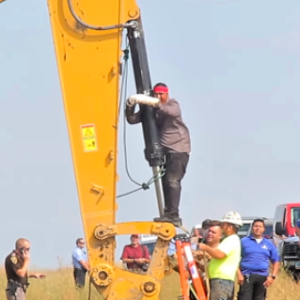More than two years have passed since Jessica Reznicek and Ruby Montoya admitted to deliberately causing millions of dollars in damage to the Dakota Access Pipeline. The duo said they “never threatened human life nor personal property,” while ironically confessing to numerous acts of sabotage, including setting fire to heavy construction equipment and using a blowtorch to burn holes in exposed sections of the pipeline.
During the months that followed, Reznicek and Montoya attained celebrity status through interviews and a speaking tour.
Unfortunately, this alarming story is not isolated.
Over the last several years, activists have demonstrated an increasing willingness to abandon the virtues of civil disobedience for a more aggressive set of tactics.
Deliberately tampering with or destroying critical infrastructure is not a form of protest. These are reckless criminal acts that endanger the lives of others and could disturb our natural environment.
While eco-extremists claim to be “saving the planet,” the reality is they are doing far more harm than good. In fact, recent history shows firsthand how severe the consequences can be when direct action is taken against critical infrastructure.
Take for instance the tragic events that unfolded in Mexico last month when vandals illegally tapped into a pipeline, triggering an explosion that killed at least 114 and injured many more. Meanwhile, communities in northern Canada lived in state of fear for much of 2008 and 2009 as eco-extremists carried out a series of bombings targeting natural gas pipeline infrastructure.
Thankfully, a disaster of this magnitude has so far been avoided in the United States … so far. The acts carried out against the Dakota Access Pipeline could have ended far differently had there been oil flowing through the pipe when the attacks occurred.
Likewise, the outcome of a recent incident in northern Minnesota could have been devastating had pipeline operators and emergency responders not acted so swiftly.
The activist group, known as the Four Necessity Valve Turners, said it acted in “celebration for the beauty of the earth” when it broke into a secure facility and attempted to close the valves controlling the flow of oil through several pipelines.
This follows a coordinated attack in 2016 during which vandals aligned with the Climate Disobedience Center simultaneously closed valves on multiple pipelines.
A security alert issued by the Pipeline and Hazardous Materials Safety Administration after the incident condemned activists for “creating the potential for serious infrastructure damage and significant economic and environmental harm, as well as endangering public safety.”
Equally alarming to these actions are the guerilla-style attacks targeting pipeline construction sites. Last month arsonists caused more than $500,000 in damage after they set fire to construction equipment at a Mountain Valley Pipeline worksite in Virginia. Meanwhile, eco-saboteurs targeted a Mariner East 2 pipeline construction site in Pennsylvania last year that also resulted in costly damage to heavy machinery.
The response to this illegal behavior — both in the media and in the courtroom — would be vastly different had the attacks been carried out by foreign-based terrorists. Instead, they are barely noticed. Perpetrators are lauded as heroes in the environmental community and afforded lenient punishments — many even have their charges dropped.
This is a disturbing trend, but thankfully policymakers across the country and in Washington are increasingly intolerant of this destructive behavior. The issue has received bipartisan supportfrom federal lawmakers. In fact, a little over a year ago 84 members of Congress urged then-Attorney General Jeff Sessions to take a harder line with individuals who knowingly damaged pipelines.
The right to peacefully protest is foundational to our democracy and an important facet to driving participation in the public policy process. Sabotaging critical infrastructure is not a form of protest — it is an illegal act that should be prosecuted to the full extent of the law.

